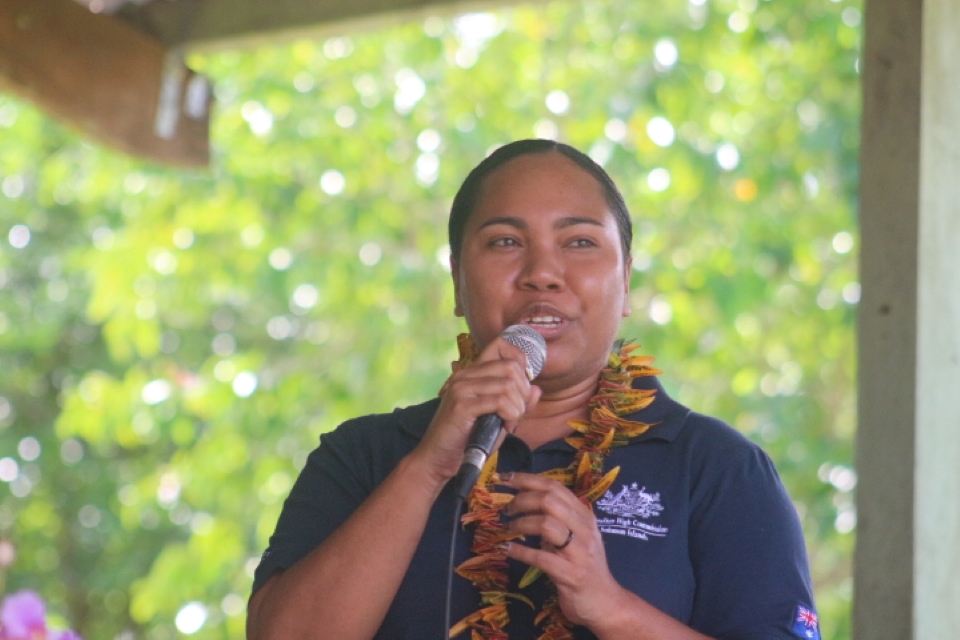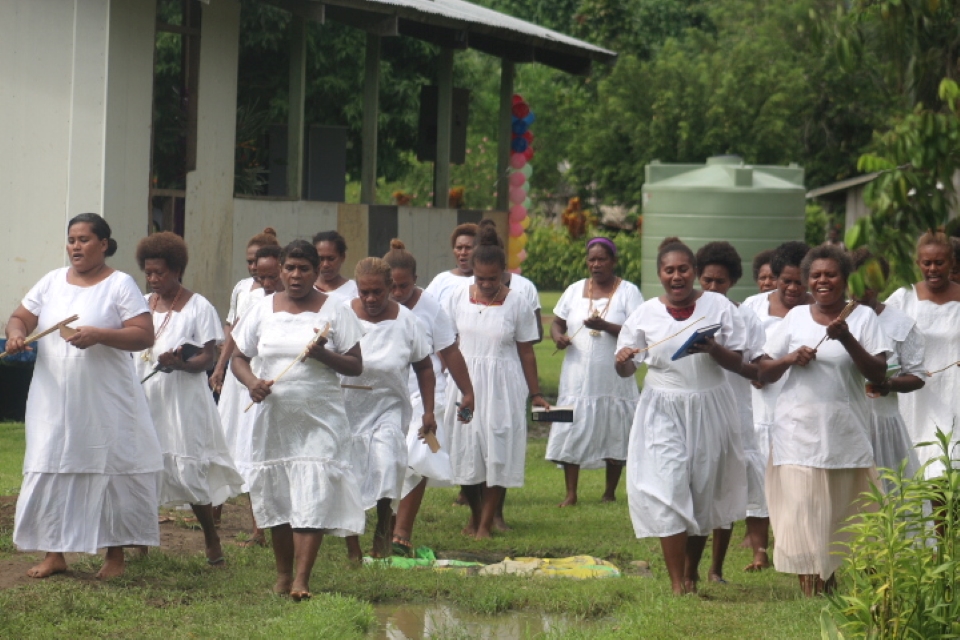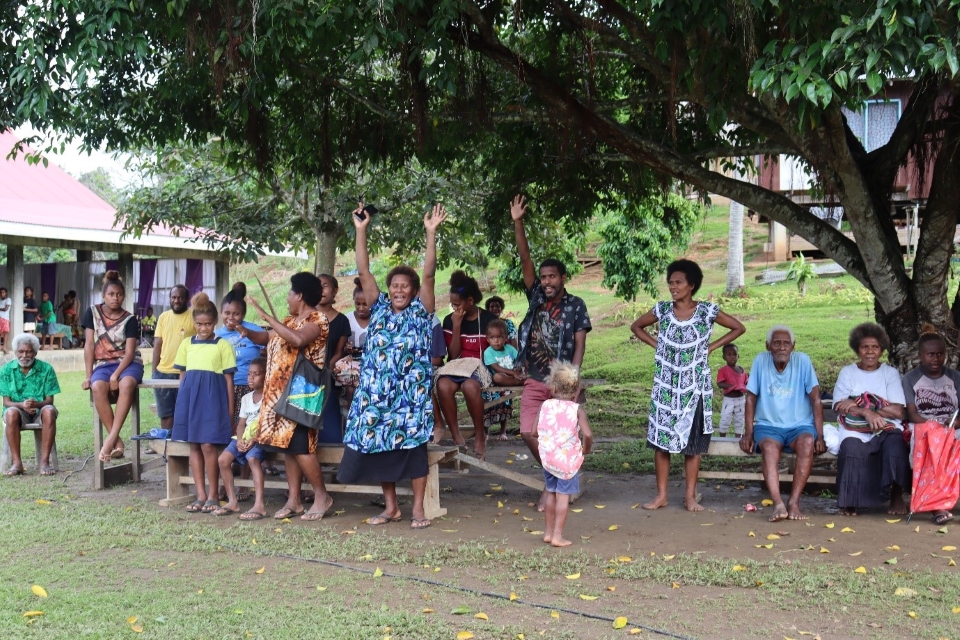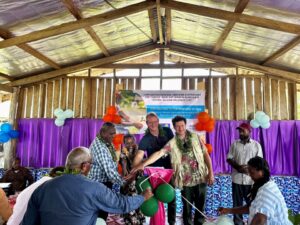BY JOHN HOUANIHAU
A milestone celebration to honor the rural village of Namoraoni in Malango Ward, Central Constituency of Guadalcanal Province for their achievement of stopping the practice of ‘Open Defaecating’ in the bushes, waterways, and other open spaces was held with festivity.
Open defecation is the human practice of defecating in fields, bushes, and bodies of water or other open spaces rather than into a toilet. They do so either because they do not have a toilet readily accessible or due to traditional cultural practices. An area is generally ‘open defecation free’ (ODF) when there is the absence of the practice of open defecation in such a location.
The No Open Poo (NOP) festivity was marked on Thursday 20 July with the theme “IUMI MAS NO SITI OLOBAOT LO PLES”.
The celebration marks the journey and culmination of the people of Namoraoni village including women, girls, and children to end Open Defecation, meaning they now have knowledge about proper sanitation and hygienic practices and no longer defecate in the bushes, near water sources, or in the village compound.
At the ceremony to celebrate the achievement of the No Open Defaecation, the DFAT Health Senior Program Manager Ms. Zina Fefera, remarked that being a part of the program is a privilege and an honour on behalf of the Australian Government.

“It is a privilege and an honor on behalf of the Australian Government to be here at this historic celebration of “No Open Defecation” in the neighborhood. This milestone celebration also serves as a reminder of the crucial role that cleanliness plays in the overall development of our rural villages in Guadalcanal.
“The purpose of this event is to raise awareness in the community about the significance of having access to sufficient sanitary facilities, which is a basic human right.
“Australia has assisted the Solomon Islands to improve its health through its continued relationship with the Australian Government and the Ministry of Health and Medical Services (MHMS).
“The Health Sector Support Programme (HSSP) is one of the various ways the Australian government does this. This will strengthen our health systems and promote important changes by raising the caliber and quantity of basic healthcare services.
“I am also proud because this year 2023, the Australian government has provided the provincial health authority with 5.3 million to support the provincial health authority’s support of the Guadalcanal province’s implementation of its health programs,” Ms Zina Fefera added.
Likewise, under the government’s Ministry of Health and Medical Services (MHMS) National Sustainable Sanitation Plan (NSSP). The NSSP is an implementation plan to scale up the delivery of sustainable sanitation services both provincially and nationally and to improve hygiene behaviors within the Rural Water Supply National Sanitation and Hygiene Policy (RWASH Policy).
Zina further added: “Through the Australian Government budget support to the MHMS, Australia also supports partners to support the MHMS, an example is our partner from UNICEF.
She said that over the years Australia provides funding to the MHMS through UNICEF to help implement the Rural Water Supply National Sanitation and Hygiene Policy (RWASH Policy) under the National Sustainable Sanitation Plan (NSSP).

“Today is an example of how UNICEF supports communities to implement the RWASH No Open Defecation policy we are here to celebrate,’’ she said.
She said that the goal of the project of the Malango Ward, Central Guadalcanal Constituency is to make sure 21 communities are triggered to have ‘No Open Defecation’ where three communities have already certified as ‘No Open Defecation’.
“We were so happy to witness and celebrate the ‘RWASH No Open Defecation’ for the community as it brings us one step closer to the goal we want to achieve. On behalf of the Australian Government, I would conclude by expressing our appreciation to the community members who actively participate in the initiative. It is through your commitment, handwork and willingness is the outcome to this success and celebration.
“I would also like to thank everyone also to witness the partnership between the AG, MHMS, UNICEF, Provincial Government, and also the communities for us to have such successful initiatives. So on behalf of us, we would like to say congratulations to the Namoraoni Community on this achievement,’’ she said.
The Ministry of Health & Medical Services (MHMS) previously introduced a program that aims to use an approach called the Community Led Total Sanitation (CLTS) as an entry point, complementing it with other initiatives, namely post No Open Defaecation (NOD) follow-up visits, sanitation marketing and communication techniques to raise awareness and eventually enable changes in social norms regarding Open Defecation (OD) to arrive at sustainable sanitation.
CLTS is an approach to triggering the entire community into realizing the need for appropriate sanitation to reduce fecal-oral diseases through active community engagements with trained facilitators. The CLTS project is targeting 21 out of the 27 target communities in Guadalcanal Province. To date 3 communities have been verified to be NOD and one of them; Namoraoni is ready to celebrate its NOD achievement.
The CLTS program under the NSSP has been introduced in the following provinces; Ranonga Island, Simbo, Vela la Vela Western Province, Russel, Central Province, North Malaita, and Central and East Guadalcanal Province.
Meanwhile, the event was attended by Namoraoni Community Chairman Mr. Genesis O, Guadalcanal Province Health Director Moses Karuni, UNICEF Representative Mr. Kshitij Joshi, Australia High Commission Senior Program Health Manager Zina Fefera, Ministry of Health Representative Miss Patricia, and Guadalcanal Province Deputy Premier.




